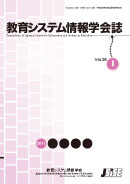28 巻, 1 号
選択された号の論文の15件中1~15を表示しています
- |<
- <
- 1
- >
- >|
巻頭言
-
2011 年28 巻1 号 p. 1-3
発行日: 2011/01/31
公開日: 2018/07/27
PDF形式でダウンロード (275K)
功績賞・功労賞
-
2011 年28 巻1 号 p. 5
発行日: 2011/01/31
公開日: 2018/07/27
PDF形式でダウンロード (171K)
平成22年度教育システム情報学会論文賞
-
2011 年28 巻1 号 p. 6
発行日: 2011/01/31
公開日: 2018/07/27
PDF形式でダウンロード (110K)
特集:ネットワークコミュニティにおける学習・教育支援
発刊のことば
-
2011 年28 巻1 号 p. 7-8
発行日: 2011/01/31
公開日: 2018/07/27
PDF形式でダウンロード (133K)
解説
-
2011 年28 巻1 号 p. 9-20
発行日: 2011/01/31
公開日: 2018/07/27
PDF形式でダウンロード (677K) -
2011 年28 巻1 号 p. 21-35
発行日: 2011/01/31
公開日: 2018/07/27
PDF形式でダウンロード (1078K) -
2011 年28 巻1 号 p. 36-49
発行日: 2011/01/31
公開日: 2018/07/27
PDF形式でダウンロード (848K)
原著論文
-
2011 年28 巻1 号 p. 50-60
発行日: 2011/01/31
公開日: 2018/07/27
PDF形式でダウンロード (1151K)
実践論文
-
2011 年28 巻1 号 p. 61-70
発行日: 2011/01/31
公開日: 2018/07/27
PDF形式でダウンロード (683K) -
2011 年28 巻1 号 p. 71-79
発行日: 2011/01/31
公開日: 2018/07/27
PDF形式でダウンロード (767K) -
2011 年28 巻1 号 p. 80-93
発行日: 2011/01/31
公開日: 2018/07/27
PDF形式でダウンロード (2217K) -
2011 年28 巻1 号 p. 94-107
発行日: 2011/01/31
公開日: 2018/07/27
PDF形式でダウンロード (1614K)
実践速報
-
2011 年28 巻1 号 p. 108-114
発行日: 2011/01/31
公開日: 2018/07/27
PDF形式でダウンロード (951K) -
2011 年28 巻1 号 p. 115-121
発行日: 2011/01/31
公開日: 2018/07/27
PDF形式でダウンロード (709K)
コミュニティ・プラザ
-
2011 年28 巻1 号 p. 122-126
発行日: 2011/01/31
公開日: 2018/07/27
PDF形式でダウンロード (1533K)
- |<
- <
- 1
- >
- >|
